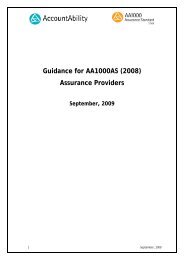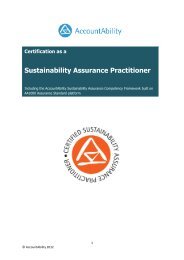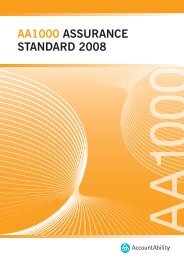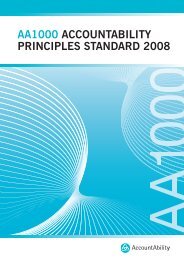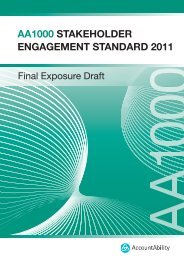The Stakeholder Engagement Manual Volume 2 - AccountAbility
The Stakeholder Engagement Manual Volume 2 - AccountAbility
The Stakeholder Engagement Manual Volume 2 - AccountAbility
You also want an ePaper? Increase the reach of your titles
YUMPU automatically turns print PDFs into web optimized ePapers that Google loves.
Introduction<br />
PRINCIPLES AND STANDARDS FOR STAKEHOLDER ENGAGEMENT<br />
Materiality<br />
Completeness<br />
Responsiveness<br />
In the context of this manual, these three principles are understood to relate to the<br />
key questions that people (both inside and outside of the organisation) will ask you<br />
when considering your relationships and engagement with stakeholders:<br />
- Firstly “Is it genuine?” Are you just going through the motions of consultation<br />
for public relations purposes, or are you serious about getting a complete and<br />
balanced picture of your organisation’s material impacts?<br />
- Secondly “Is it fair and well informed?” Does the process of engagement allow<br />
all stakeholders to be considered or are signifi cantly impacted stakeholders<br />
ignored? Are internal and external processes in place that enable the organisation<br />
to gain a good understanding of its impacts and what its stakeholders think of it?<br />
- And fi nally “What diff erence does it make?” What are you going to do about the<br />
issues raised, how does this impact on other aspects of your performance, and<br />
how does it benefi t your business? Are you willing to make the changes that<br />
are required to integrate possibly new issues into your management processes<br />
and strategy? Also: In which way does this benefi t your business?<br />
Th e handbook will guide you through an approach to stakeholder engagement that<br />
stands fi rm when assessed against these questions. Whilst each of the three principles<br />
applies at each Stage, they have particular relevance at diff erent points in the overall<br />
process. Th e dark cells in the table below indicate which principle is most important<br />
in each Stage. At the beginning of each chapter there is also an interpretation of these<br />
principles as they apply to that Stage.<br />
THE RELEVANCE OF MATERIALITY, COMPLETENESS AND RESPONSIVENESS TO THE FIVE STAGES<br />
OF STAKEHOLDER ENGAGEMENT<br />
<strong>Stakeholder</strong> <strong>Engagement</strong> Stage<br />
Dominant<br />
Principle<br />
Stage<br />
Think Strategically Analyse and Plan Strengthen Capacities Engage with <strong>Stakeholder</strong>s Act and Review



